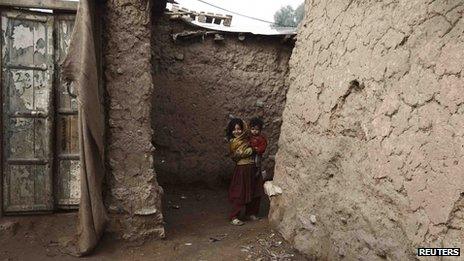Oxfam seeks 'new deal' on inequality from world leaders
- Published

The 100 richest people in the world earned enough last year to end extreme poverty suffered by the poorest on the planet four times over, Oxfam has said.
Ahead of next week's World Economic Forum in Switzerland, the charity urged world leaders to tackle inequality.
Extreme wealth was "economically inefficient, politically corrosive, socially divisive", the report said.
The global economic system required reform so that it worked "in the interests of the whole of humanity".
A four-day summit involving political and economic leaders runs in Davos from next Wednesday.
In its report entitled The Cost Of Inequality: How Wealth And Income Extremes Hurt Us All, the UK charity said that efforts to tackle poverty were being hindered by an "explosion in extreme wealth".
The richest one per cent of the world's population had increased its income by 60% in the last 20 years, Oxfam said.
It reported that while the world's 100 richest people enjoyed a net income of $240bn (£150bn) last year, people in "extreme poverty" lived on less than $1.25 (78p) a day.
"We can no longer pretend that the creation of wealth for a few will inevitably benefit the many - too often the reverse is true," said Oxfam chief executive Barbara Stocking.
"Concentration of resources in the hands of the top 1% depresses economic activity and makes life harder for everyone else - particularly those at the bottom of the economic ladder."
The charity called for a "global new deal to reverse decades of increasing inequality".
Its suggestions for leaders due at the Davos summit include:
- Closure of tax havens around the world
- A reversal of "the trend towards more regressive forms of taxation"
- A global minimum corporation tax rate
- Increased investment in free public services and safety nets for people out of work or ill
"As a first step world leaders should formally commit themselves to reducing inequality to the levels seen in 1990," Ms Stocking said.
"From tax havens to weak employment laws, the richest benefit from a global economic system which is rigged in their favour.
"It is time our leaders reformed the system so that it works in the interests of the whole of humanity rather than a global elite."